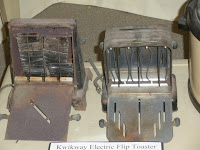Boone County Historical Museum was our last stop on our tour of Boone, Iowa. It was starting to get late, and we had a long trip home; but since we were there we decided to visit the museum anyway. The admission was $3 per adult and free for anyone under 18--very reasonable! As soon as we walked in, a smiling museum curator greeted us, gave us a brief introduction to the museum, turned on the lights in various rooms, and told us to let her know if we had any questions.
The first room we visited was dedicated solely to Kate Shelley, a local heroine who saved the lives of many. She risked her life crawling across the Honey Creek railroad bridge in the middle of a stormy night brightened with flashes of lightning. She then ran a half mile to the railroad depot at Moingona to warn an incoming passenger train carrying 200 people that the storm had washed out trestles on the bridge and notify rescue workers that a pusher locomotive had just plunged into the creek.
The museum features the lantern she carried on that stormy night, her sewing machine, and awards she received. The story is presented in very readable format in posters on the walls. Kate Shelley was the first woman in the United States to have a bridge named after her. A train, the Kate Shelley 500, was also her namesake.
In the front room was what looked like a large chest of very small drawers. Each drawer was labeled and contained a glass display. In these displays were presidential campaign buttons from the election of 1896 to the present.
 |
| McKinley vs Bryan, 1896 |
 |
| F.D.R. vs Landon |
 |
| Reagan vs Carter, 1980 |
In other drawers were coin collections and various medals.
These tools are barbed wire makers. Between them is a sample of the barbed wire. Imagine how much work it must have been to make enough barbed wire to fence a pasture!
The next room we visited contained a selection of animals native to Iowa.
On display there were pheasants, Canadian geese, a badger, red fox, chipmunk, coyote, a woodchuck, and several other species.
The mountain lion looked like it had seen better days, but the Snowy Owl was beautiful. There was a selection of birds, a wooly mammoth tusk found in Boone County in 1905 and arrow heads.
Northern Pike and Paddlefish, like these, are supposedly fish of the Des Moines River; I was a bit shocked considering I have never caught anything more interesting than a catfish in Iowa--and I have a sad feeling I may never reel in any beauties like this.
Old hunting guns, a few uniforms, and an autographed picture of Abraham Lincoln completed our tour of the downstairs, and we proceeded to the next floor.
Since the museum is currently under renovation, not everything was perfectly ordered, but I thought the format for the upstairs was fascinating. The large open room featured a display on each decade of the 20th century, complete with period dress, political slogans, popular devices and inventions, and a historical summary of the time.
 |
| 1900-1909 |
 |
| 1910-1919 |
 |
| This is what a washing machine used to look like. |
A radio and a couple toasters
 |
| Isn't the dress beautiful? |
 | ||
What people used to *rake* their carpets.
|
 |
| And this, my dear friends, is what a portable computer (laptop?) used to look like. |
The Boone County Historical Museum was fascinating! I would definitely recommend it to anyone looking to learn more about United States History while visiting Boone, Iowa.














No comments:
Post a Comment